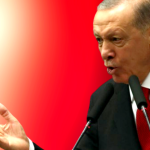Artur Widak/NurPhoto via Getty Images; Sean Gallup/Getty Images; Mikhail Svetlov/Getty Images
- The accountancy giants PwC, KPMG, EY and Deloitte said they would exit Russia.
- PwC’s Russian clients include Sberbank, Gazprom, and Russia’s central bank, Financial Times said.
- Deloitte was the latest to announce its exit over Russia’s invasion of Ukraine.
The accountancy giants PwC, KPMG, EY, and Deloitte have announced that they’re stopping operations in Russia amid the ongoing attacks on Ukraine.
PwC and KPMG both announced the move on Sunday, while EY and Deloitte followed the next day.
Companies have been scrambling to cut ties with Russia since it invaded Ukraine on February 24. Some have shut their Russian offices, closed stores, or ended online services or sales.
PwC, KPMG, and EY are global networks of individual firms that are separate legal entities, a structure required to comply with laws stipulating that audit firms must be locally owned and independent.
“As a result of the Russian government’s invasion of Ukraine we have decided that, under the circumstances, PwC should not have a member firm in Russia and consequently PwC Russia will leave the network,” PwC’s statement said. PwC Russia has about 3,700 employees across 11 cities in Russia.
PwC Russia’s clients include Sberbank, the country’s largest bank; the Kremlin-controlled energy giant Gazprom; and the Central Bank of Russia, Financial Times reported.
Sberbank and Russia’s central bank have both been targeted by Western sanctions aimed at hobbling Russia’s economy. PwC did not immediately respond to Insider’s query about whether these companies were among its clients.
PwC is also pulling out of Belarus, where it has a staff of 25, Financial Times reported.
PwC said it would undertake an “orderly transition” and focus on the well-being of its staff at PwC Russia. Its Russian firm said in its own statement that, though it was leaving the PwC brand, it was confident in its business.
PwC added that it was “doing all” it could to help its more than 750 employees in Ukraine and support humanitarian efforts.
KPMG said in a statement that its firms in Russia and Belarus, which between them had more than 4,500 employees, would leave the KPMG network. It told Financial Times that this would be finalized within days.
KPMG said that ending its working relationship with these employees was “incredibly difficult,” but that “this decision is not about them — it is a consequence of the actions of the Russian Government.”
“We are a purpose-led and values-driven organization that believes in doing the right thing,” it added.
EY said on Monday that it was restructuring its Russian member firm, which had more than 4,700 employees, to separate it from EY’s global network. It added that EY would stop serving Russian government clients, state-owned enterprises, and sanctioned entities and people.
EY said it was providing financial support, relocation help, transportation, and immigration services to about 700 colleagues in Ukraine and Eastern Europe.
In a press statement on Monday, Deloitte said:
“Last week, Deloitte announced it was reviewing its business in Russia. We will separate our practice in Russia and Belarus from the global network of member firms. Deloitte will no longer operate in Russia and Belarus.
“While we know this is the right decision, it will have an impact on Deloitte’s ~3,000 professionals located in Russia and Belarus. Like others, we know our colleagues in Russia and Belarus have no voice in the actions of their government. We will support all impacted colleagues during this transition and do all we can to assist them during this extremely difficult time.”
Severing ties with their Russian partners allows the accounting giants to avoid falling foul of sanctions against Russia because of the work of their Russian partners, which could have been targeted by the Kremlin if they complied with the sanctions, Financial Times reported.
McKinsey & Company said on Thursday that its Russian offices would remain open, but that it wouldn’t take on new clients and would stop existing work with both government and state-owned entities.
“After our remaining engagements in Russia conclude, all client service in the country will be suspended,” it said.
Accenture said on Thursday that it was discontinuing its business in Russia, where it had 2,300 colleagues, while Boston Consulting Group said on Friday that it was suspending work with Russian clients, but that its Moscow office was still open.
Powered by WPeMatico






